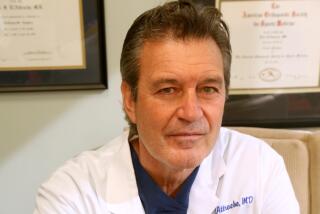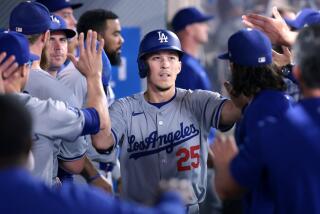BEHIND IN THE COUNT
- Share via
Todd Stottlemyre has long been recognized as part pitcher, part warrior. Intense. Emotional. Unwilling to give in or give up.
The 34-year-old right-hander has opened the new season with a 3-0 record for the Arizona Diamondbacks.
He is pitching and winning with a 70% tear in his right rotator cuff and a partial tear in the cartilage surrounding that shoulder.
The career-threatening injuries were diagnosed last May 20. It is believed that no pitcher has returned successfully from an extensively torn rotator cuff without surgery.
Stottlemyre rejected the surgery, choosing instead a demanding therapy program. He is basically pioneering that response in the way that Tommy John and Dr. Frank Jobe pioneered elbow reconstruction.
For Stottlemyre, there was no guarantee, either with the surgery or its 18-24 months of recovery.
He had signed a four-year, $32-million contract as a free agent before the 1999 season.
He saw that as a debt to pay and wanted to be back pitching as soon as possible, which meant a rigorous regimen of strengthening muscles and altering mechanics.
Now, even as Stottlemyre starts every fifth day, the process continues--but it is compounded by a wounded heart.
Again.
In 1981, when Todd was 15, his brother and closest friend, Jason, 11, died of leukemia.
Stottlemyre, for a long time, blamed himself.
Wasn’t that his bone marrow Jason had just received in a transplant?
Wasn’t he somehow responsible for Jason’s death?
Now, Stottlemyre’s father and mentor, Mel, the New York Yankee pitching coach and three-time 20-game winner with the Yankees in the ‘60s, has revealed that he has bone marrow cancer and is beginning four months of chemotherapy leading to a stem cell transplant.
If adversity builds strength and character, Todd Stottlemyre was saying in the Diamondback clubhouse in San Diego the other day, “There comes a point where you want to call time out and say, ‘Hey, I’ve got all the strength and character I need.’ My dad has been so special in my life that it rips my heart out, knowing what he’s going through, but the one thing he hasn’t said is, ‘Why me?’ or that life is unfair.
“I mean, his strength and optimism is unbelievable and has provided strength for the whole family. He’s setting an example by saying, ‘I’m going to continue to show up, continue to do my job. Yes, I have this condition, but I don’t want anyone feeling sorry for me. Life goes on, and you have to keep up with the fight.’ ”
The prognosis is uncertain, but the condition was discovered early.
The Yankees, responding to Manager Joe Torre’s prostate cancer and Darryl Strawberry’s colon cancer, conduct a more extensive series of blood tests on players and officials than most clubs.
The senior Stottlemyre is considered a key contributor to New York’s recent domination. His pitching staffs have finished in the top five in American League earned-run averages each of the last four years, leading in 1997 and ’98.
He intends to remain with the club unless weakened, on some days, by the chemo or a disease that can destroy the immune system, bone strength and kidney function.
His condition was revealed to Yankee players on April 10.
Todd wanted to join his father immediately, but Mel wouldn’t hear of it, telling his son to get his rest, do his job and “get me a win today.”
Stottlemyre responded with a typically dogged victory over the San Diego Padres.
“I always want to be the winning pitcher, but only in the context of getting the win for the team,” Stottlemyre said.
“I wanted that win for Todd, and for Dad.”
He followed it with another inspired victory over the San Francisco Giants, remembering his mother, Jean, as well.
“The part that really bugs me about Dad’s illness is that this is the second time Mom has had to be the trouper, carry the stress, stay strong, keep the family thinking positive,” Stottlemyre said. “I was talking to my brother [Mel Jr.] about it and we realized that we’re always asking, ‘How’s Dad?, How’s Dad?’ We have to remember to ask, ‘Hey, Mom how are you?’ ”
Jean and her husband received the National Recognition Award from the Leukemia Society of America in 1992 because of their involvement after Jason’s death. Todd Stottlemyre has donated $1 million to leukemia research.
His brother had been in and out of hospitals for five years and had received Todd’s marrow only a few days before lapsing into a coma and dying.
“It was hell,” Stottlemyre said. “I was 15. I couldn’t help but be angry. I couldn’t help but think it was wrong, unfair, and that I was responsible because it was my marrow that had sent him to the grave. I felt guilt for a long time, but I eventually came to understand the disease and the way it works and was able to let go of that guilt.
“The way I look at it now is that I’ve been on two World Series teams but those experiences don’t compare to trying to give life to my brother. Even though it wasn’t successful, that was the greatest achievement of my life, and my hope now is that we’ll meet again someday in a better place.”
It took time, of course, for a teenage Stottlemyre to work through his emotions, but a lasting legacy of Jason’s death was that it produced in Todd a fierce competitiveness. That intensity prompted his father to talk him out of playing high school football because of the damage he might do to himself and others. That intensity, at times, has riled opponents, led to fights and, some say, gotten in the way of Todd’s success.
Over a 12-year, five-team career, however, Stottlemyre has been a model of consistency and dependability.
Aside from strike-shortened 1994, he started at least 25 games every season from 1990 through 1998, never winning more than 15 games or losing more than 11.
It was also that fierce competitiveness, his sense of dependability and accountability, that prompted him to reject surgery for the torn rotator cuff, the very injury that had ended his father’s pitching career at 32. Instead, Stottlemyre embarked on an uncharted course that ultimately included 50 exercises over four-six hours a day.
The goal was to strengthen every muscle to compensate for the tear and rework his mechanics to put more stress on his legs than his arm.
Stottlemyre has added 17 pounds of muscle and weighs 206 pounds.
He returned to the rotation on Aug. 20, exactly three months after getting the diagnosis, went 2-1 in his last seven starts and threw 124 pitches over 6 2/3 innings in a 7-1 victory over the New York Mets in Game 2 of the National League division series.
His fastball was clocked at 94 mph, the fastest of his career, and that velocity remains, he said.
Nevertheless, Stottlemyre knows what he is dealing with, knows that on any pitch, his shoulder could go.
“With that kind of tear, you have to be cautious, but I can’t compete that way,” he said. “I can’t think about it when I’m pitching. I’m privileged to work for a manager [Buck Showalter] and pitching coach [Mark Connor] who continue to give me the ball while assuming the caution by keeping me on a pitch count [of about 100 a game]. My hope is to get back to a level where no one has to worry about it and I can grind it out like I once did, throwing 120, 125 pitches a game.”
In the meantime, Stottlemyre goes about pitching with his characteristic tenacity, following his father’s wishes that he stay on the job and on track.
A tough time? Stottlemyre has known tough times.
He said, “It’s a shame that you need situations like this to put life in perspective, and as a reminder for me that my ultimate wish is to be just like my dad, that I hope I can show his same spirit and courage.
“He’s always been more than a father. He’s been a mentor, friend and brother, all the things a son could want.
“When Jason died, he took two years off to be with [Mel Jr., who pitched briefly for the Kansas City Royals and is now an assistant coach at Nevada Las Vegas] and myself. He’s always been there to pick me up, to be positive when I’ve been bad.
“Obviously, there are going to be sleepless nights, but the last thing he wants is anyone feeling sorry for him, and the way I have to look at it is that God has a plan for all of us. Instead of questioning it, I hope and pray he creates another miracle. He’s done it before.”
More to Read
Go beyond the scoreboard
Get the latest on L.A.'s teams in the daily Sports Report newsletter.
You may occasionally receive promotional content from the Los Angeles Times.










